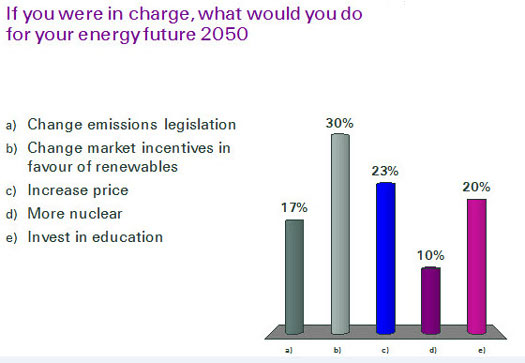| Nov 18, 2013 |
Connecting generations: Meeting the energy challenge
|
|
(Nanowerk News) Securing affordable energy supplies, changing the energy mix towards a more sustainable and renewable portfolio, as well as providing energy to those who currently have no access ranks high on the global agenda. In order to discuss these issues as part of Swiss Re's 150-year anniversary event series 'connecting generations', Swiss Re organised a small conference entitled 'Meeting the energy challenge'.
|
|
The event which took place at the Centre for Global Dialogue brought together a mixed age group of entrepreneurs, industry experts, and researchers, to discuss Switzerland's contribution to our energy future.
|
|
Professor Dr Fritz Fahrni (ETH Zurich, University of St. Gallen) delivered the first keynote speech. From an engineering and scientific perspective, Professor Fahrni outlined our energy challenges and how we could meet them. In the Swiss context, achieving sustainable energy use by 2050 will require using about half as much energy per person as we currently consume; the use of practically no oil for heating or gasoline for mobility; producing electricity with renewable resources; emitting five times less CO2 into the air than today; and producing energy without nuclear plants.
|
|
Switzerland is actually in a good position to reach these goals. As a result of favourable natural conditions, renewable energy sources such as hydro, biomass, and photovoltaics will take a larger share of the future energy mix. Moreover, Swiss society is probably receptive to shifting some energy consumption patterns. Professor Fahrni portrayed several energy-efficient innovations. These measures include translucent glass, nano-materials and smart consumption meters.
|
|
Dr Claire Michelle Loock, Head Client Solutions BEN Energy and second keynote speaker, presented an incentive structure to encourage energy savings among consumers. Neuro-scientific research has demonstrated that consumers respond to signals regarding the sustainability of their energy consumption; and may actually enter into 'competition' to reduce their carbon footprint. BEN Energy offers platforms for energy efficiency derived from psychological studies that have been adopted by 19 energy providers and reach 20% of all Swiss households.
|
|
In the subsequent panel discussion, Eva Geilinger, Project Manager at Topten International Services, noted that an informed consumer can already make a choice - and hence a difference - when selecting an energy efficient product. Information platforms, such as Topten support this choice by highlighting the electricity consumption of household objects.
|
|
Erik Schmausser, leader of energy efficient projects, Swisspower Services, reported from his experience with the urban utility companies, SMEs, and public administrations. In these sectors there is vast savings and optimisation potential yet to be realised, both in terms of energy consumption and costs. These can be found in tailoring the source of energy used according to the type and age of building in question.
|
|
Jan Ossenbrink, doctoral candidate at the ETH Chair of Sustainability and Technology, elaborated on the innovation culture of large corporates active in the energy sector. While they have the financial capacity to invest more into renewables, their long term investments in largely fossil based fuels or nuclear make these companies move more slowly. Jan also pointed out that the role of education is of utmost importance, not just in regard to training our future engineers but also to training financial planners and consumers.
|
|
Last but not least, Rupert Wimmer, weather and energy originator at Swiss Re Corporate Solutions, provided an insight into the different risks the renewables sector is facing, be they business risks such as technological obsolescence; building up risks from unproven technologies and how they behave while faced with natural hazards; market risk, in the form of price volatility; or weather risk such as lack of wind or sunshine. These are all risks in which Swiss Re is taking an interest. There are huge differences between emerging and established markets; in the latter there is better access to information, making project planning easier.
|
|
The panellists agreed that full cost transparency broken down by energy source is a necessary precondition to the much wider use of renewables. One area behavioural research has to address is compensatory actions on the part of individuals; if they make savings in one area, they tend to believe they can compensate with a more inefficient consumption elsewhere.
|
|
The audience discussion addressed three topic clusters. One focused on the controversy of whether realising a sustainable energy future will be feasible while markets distrust long term investments in renewable energy projects. This is partly due to different time horizons; and partly due to substantial hindrances in regard to renewable energy projects. The two other topic clusters were the debate between where to invest first in renewable energy; against the school of thought that suggests not investing at all in renewables while the returns are so unclear.
|
|
To get an understanding of how the audience would act in this status of ambiguity, a vote was conducted at the end of the evening. It became clear that many would opt for renewables. Comments from the panel also went into this direction. However, many advocated a combined approach of the proposed measures.
|
 |
|
In order to achieve a less carbon-heavy energy future, a considerable percentage of voters would also consider more nuclear. The discussion was heated whether the fact that nuclear was climate friendly justifies the risks ? especially after Fukushima.
This article is based on 'Connecting generations: Meeting the energy challenge' which took place at the Swiss Re Centre for Global Dialogue on 30 October 2013.
|


